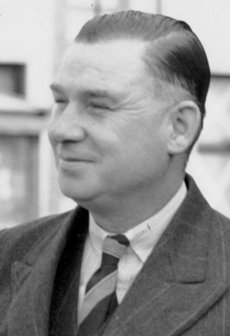

An Invitation to Buckingham Palace
By Eric L Sewell
This article was originally published in the April 2002 edition of Soul Search, the journal of The Sole Society.
Mike Sewell’s article in Soul Search, Aug 2001 about my father, George Samuel Sewell, took me completely by surprise. Under pressure from the Editor I have been persuaded to make a contribution of my own
(Thanks Eric! - Ed).My father was under-age when in 1915 he volunteered for the Durham Light Infantry. It took six months before my grandmother succeeded in persuading his commanding officer to release him from the Army in order to begin an apprenticeship as a marine engineer. Shortly before the end of the war he joined the Merchant Navy, where he remained until appointed as a maintenance engineer with British Petroleum (BP) in 1924.
We moved to Bristol in 1931 and then to Hull in 1934, where he became the works engineer for Shell, Mex & BP – BP having merged with the two other oil companies. He was based just outside Hull at Saltend, a large oil terminal on the Humber with acres of storage tanks the size of gasometers. While Hull was pounded, by some miracle Saltend only received two direct hits with bombs.

 My
father was amongst the first group awarded the newly instituted George Medal on
30 September 1940 but it was not until 27 May 1941 that the investiture took
place. The invitation from the Central Chancery of the Order of the
Knighthood, as it was styled, allowed two tickets for relations or friends.
So my mother and I were able to be present, but my young brother, Allan, had to
be left at home with a neighbour.
My
father was amongst the first group awarded the newly instituted George Medal on
30 September 1940 but it was not until 27 May 1941 that the investiture took
place. The invitation from the Central Chancery of the Order of the
Knighthood, as it was styled, allowed two tickets for relations or friends.
So my mother and I were able to be present, but my young brother, Allan, had to
be left at home with a neighbour.
Despite the uniqueness of the occasion my memories of the event are pretty insubstantial. I asked for time off school, but to avoid embarrassment I did not explain the reason and no one ever seemed to find out. The evening before the investiture we travelled by train from Hull to London. It was my first visit to the capital and therefore my first ride on the Underground. I can recall seeing Londoners settling down for the night on the platforms to escape the threat of air raids.
When I next visited London in 1946 it was as a raw Army conscript attending an interview at the War Office. In London I was not particularly aware of the bomb damage, possibly because the West End had escaped the worst of the blitz – unlike poor old Hull. We stayed at the Strand Palace Hotel as guests of Shell, Mex & BP and by a stroke of luck we had a night’s rest in a real bed undisturbed by air-raid sirens.
We were due at Buckingham Palace ‘not later than 10.15 o’clock am’, according to the invitation. To my disappointment the Palace guards were dressed in wartime khaki. Nevertheless, civilians attending the investiture were asked to wear morning dress, although I have no recollection of my father being so attired.
What I wore is a total mystery - I did not possess a suit, so maybe I put on my school blazer or gabardine raincoat. We were ushered into an ornate room furnished with rows of gilded chairs and seated fairly close to the front. The award-holders, possibly 50 or 60 of them, were instructed in the formalities, in particular not to speak to the King unless addressed.
King George VI appeared on the platform in naval uniform, but without the trumpet fanfare I might have expected. The proceedings were highly formal and conducted with military precision. One by one the honours were presented, each recipient bowing before the monarch in the prescribed fashion. The King, having fulfilled his office, duly departed without further ceremony. Sadly, no photographs were taken as we emerged from the Palace, so I have no visual record of the event. Maybe photography was banned.
Afterwards, the company secretary, a pleasant middle-aged man presumably with a gift for conversing with the young, took me with two other children to lunch at the Strand Palace Hotel. Meanwhile the company hierarchy entertained my parents across the road at the Savoy. Although I must somehow have taken these events in my stride, everything that day was totally beyond my experience – almost unreal.
Returning to Hull that evening, the illusion was quickly dispelled by the realities of wartime existence. I have a vivid memory of a summer dusk descending over the shattered streets of the city centre. The devastation that Hull endured was never publicised, maybe because as a place it was not sufficiently newsworthy. I believe Hull suffered more casualties per head of the population than any other city in Britain. Back home we returned to the miserable routine of sleeping down the garden in our waterlogged air-raid shelter.
Six months later, on the 4th November 1941, my father returned to the Palace to receive his second George Medal, or to be more precise the Bar to the first medal. This time he invited his brother, Richard, who had received the Military Medal in the 1914-18 War and had presumably been decorated in the field